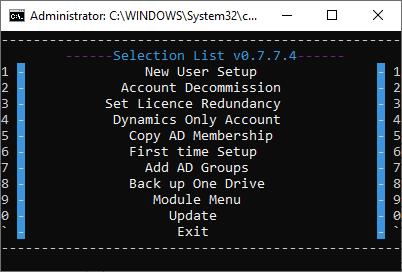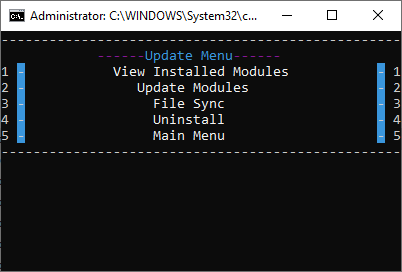OfficeAutomation
I created a tool for onboarding new hires and departing existing users. It will create and update attributes from the local Active Directory and Azure Active Directory. In addition to this it can also backup a users onedrive to an external location.
_RunAccount.bat
Checks if an admin credential has been saved, if not prompt to set one up
Display the options menu
Go to the selected option and loop
New user setup
Options
This will call the New AD user_form_grab.ps1 which in turn takes its functions from NewUserModules.psm1.
In New AD user_form_grab.ps1 the security groups are defined and can be changed.
$DefaultPass set the default password
$UserFolderLocation the default folder locations to be created for the user
$SomeCompanyFolderLocation default folder locations to be created for SomeCompan users
How to use
Users must be submitted through a ms forms link
After the new user is submitted an email will be sent to the submitter with the entry ID.
The information is saved to an excel sheet in the company one drive
The scrip will attempt to sync to the sheet by opening and closing the file.
An ID prompt will then be given. Enter what was emailed.
It will ask if you want to check the license inventory and will display the currently available licenses
If the licenses are out I will direct you to the license admin page where it can be updated.
This process could be automated, but I thought it best left to human review.
A prompt requesting a username for the user will come up. Enter the new username
The scrip will start creating the accounts and assigning the appropriate licenses.
Might take a while even though it does send a sync command to the server.
Then its location in AD will be determined from the next two prompts. Location and Division
If a laptop is already set aside, you can enter it and it’ll be included on the generated hire checklist.
Same with the fob
It will then ask if the user wants to add the user to set ad group membership defaults for accounting, engineering and construction are currently setup. This will then assign the default group membership to the account.
During this step it will also create all the default folders i.e. scans, home, documents on the appropriate server and set permissions on it. This is based off the office location and what company was selected.
Final steps check if the ad account is synced to azure and is licensed
Export a new hire sheet to the new hire sheets folder
Account Decommission
Options in Block account.ps1
$EmailList the domains that we have. Used to check if there is an account in azure.
$BackupLoc the location to create the backup folder
How to use
Prompt will appear asking for the user to be decommissioned
Start time will be stamped to the log
-checks if the user exists in ad, if not stop
-moves it to the appropriate OU
-sets the description to disabled
-hide from the global address list
-record group membership and export it to the log and csv
-remove groups
-disables the user
One drive files will then be backed up to a server
-file structure is copied to a temp file
-after its done the structure is used copy each folder to the backup location.
CheckAll will check all the emails to see if there is an associated user account and if so, remove it
-Disable active sync
-Disable OWA
-Hide from global address list
-Set to shared
-Disable account
-Copy ad groups to log
-Remove from groups
-Remove associated licenses
Stamps end time
Set License Redundancy
If the license did not get set this can be run to set the license.
This function is obsolete, problem seems to have been solved within new user setup
This is a backup
Dynamics Only Account
Creates a dynamics only account does not use the forms submission
Manual entry of name and username
Copy AD Membership
Will copy the ad group membership from one account to another
Two prompts one for the account to copy and the target user.
First time Setup
Installs azure and msoline modules to access online services
Stores password as .cred file and username
Installs AD if not already installed
Add AD Groups
Will run the add ad groups function for the last user setup which is stored in the support files folder as UPN.txt<![endif]–>
_RunAccount.bat
Checks if an admin credential has been saved, if not prompt to set one up
Display the options menu
Go to the selected option and loop
New user setup
Options
This will call the New AD user_form_grab.ps1 which in turn takes its functions from NewUserModules.psm1.
In New AD user_form_grab.ps1 the security groups are defined and can be changed.
$DefaultPass set the default password
$UserFolderLocation the default folder locations to be created for the user
$SomeCompanyFolderLocation default folder locations to be created for SomeCompany users
How to use
Users must be submitted through a ms forms link
After the new user is submitted an email will be sent to the submitter with the entry ID.
The information is saved to an excel sheet in the company one drive
The scrip will attempt to sync to the sheet by opening and closing the file.
An ID prompt will then be given. Enter what was emailed.
It will ask if you want to check the license inventory and will display the currently available licenses
If the licenses are out I will direct you to the license admin page where it can be updated.
This process could be automated, but I thought it best left to human review.
A prompt requesting a username for the user will come up. Enter the new username
The scrip will start creating the accounts and assigning the appropriate licenses.
Might take a while even though it does send a sync command to the server.
Then its location in AD will be determined from the next two prompts. Location and Division
If a laptop is already set aside, you can enter it and it’ll be included on the generated hire checklist.
Same with the fob
It will then ask if the user wants to add the user to set ad group membership defaults for accounting, engineering and construction are currently setup. This will then assign the default group membership to the account.
During this step it will also create all the default folders i.e. scans, home, documents on the appropriate server and set permissions on it. This is based off the office location and what company was selected.
Final steps check if the ad account is synced to azure and is licensed
Export a new hire sheet to the new hire sheets folder
Account Decommission
Options in Block account.ps1
$EmailList the domains that we have. Used to check if there is an account in azure.
$BackupLoc the location to create the backup folder
How to use
Prompt will appear asking for the user to be decommissioned
Start time will be stamped to the log
-checks if the user exists in ad, if not stop
-moves it to the appropriate OU
-sets the description to disabled
-hide from the global address list
-record group membership and export it to the log and csv
-remove groups
-disables the user
One drive files will then be backed up to a server
-file structure is copied to a temp file
-after its done the structure is used copy each folder to the backup location.
CheckAll will check all the emails to see if there is an associated user account and if so, remove it
-Disable active sync
-Disable OWA
-Hide from global address list
-Set to shared
-Disable account
-Copy ad groups to log
-Remove from groups
-Remove associated licenses
Stamps end time
Set License Redundancy
If the license did not get set this can be run to set the license.
This function is obsolete, problem seems to have been solved within new user setup
This is a backup
Dynamics Only Account
Creates a dynamics only account does not use the forms submission
Manual entry of name and username
Copy AD Membership
Will copy the ad group membership from one account to another
Two prompts one for the account to copy and the target user.
First time Setup
Installs azure and msoline modules to access online services
Stores password as .cred file and username
Installs AD if not already installed
Add AD Groups
Will run the add ad groups function for the last user setup which is stored in the support files folder as UPN.txt
Module/Update Menu
View Installed Modules Shows which modules are installed
Update Modules Will update any modules listed in the PSModules.txt
File Sync Will update all logs from the server and save recent files to the server based off of last edit time
Uninstall Removes all modules listed in the PSModules.txt as well as RSAT.txt
I removed everything company specific from the scrips and swapped them with temporary names like “Company” or “SomeOtherComapny”

